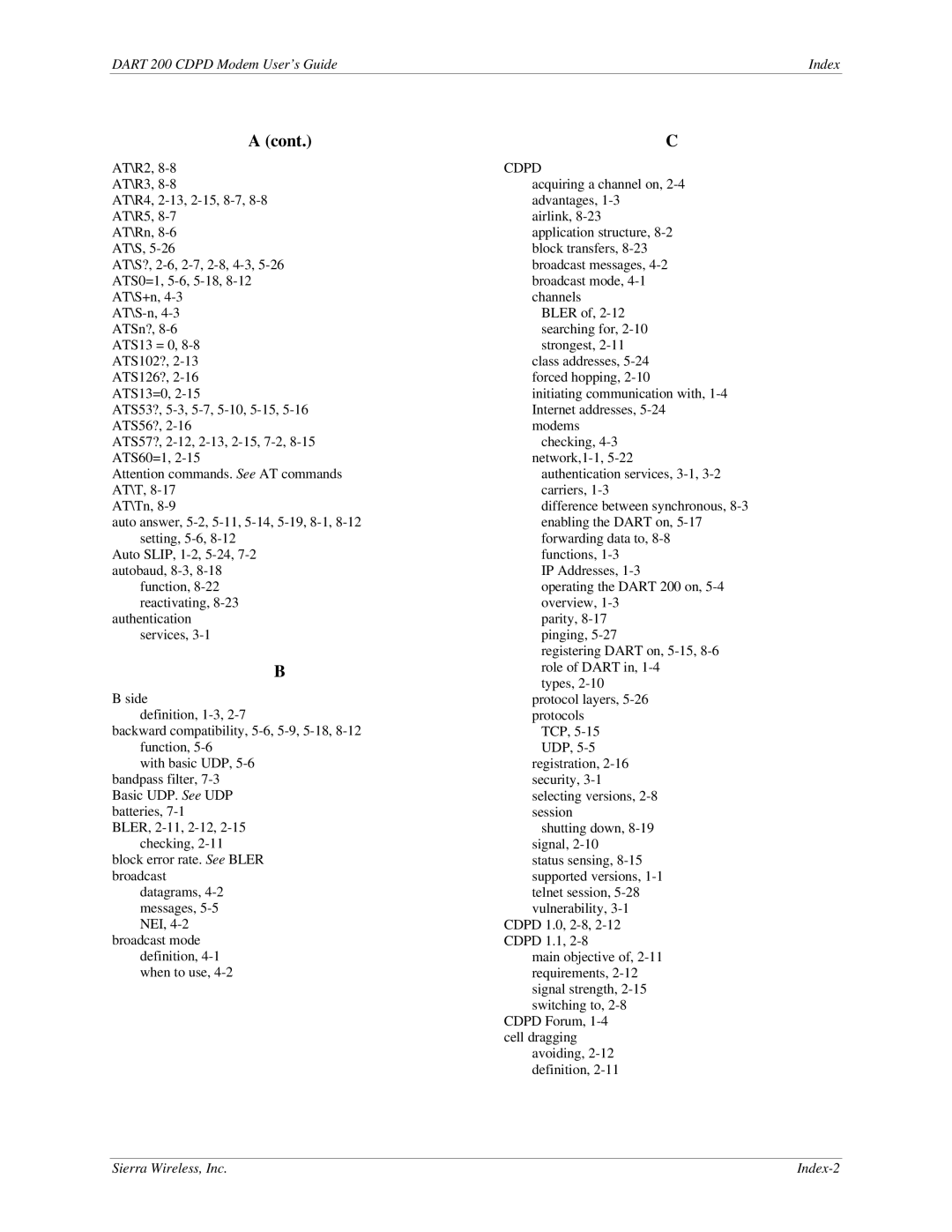A (cont.)
AT\R2, 8-8
AT\R3, 8-8
AT\R4, 2-13, 2-15, 8-7, 8-8 AT\R5, 8-7
AT\Rn, 8-6
AT\S, 5-26
AT\S?, 2-6, 2-7, 2-8, 4-3, 5-26 ATS0=1, 5-6, 5-18, 8-12 AT\S+n, 4-3
AT\S-n, 4-3 ATSn?, 8-6 ATS13 = 0, 8-8 ATS102?, 2-13 ATS126?, 2-16 ATS13=0, 2-15
ATS53?, 5-3, 5-7, 5-10, 5-15, 5-16 ATS56?, 2-16
ATS57?, 2-12, 2-13, 2-15, 7-2, 8-15 ATS60=1, 2-15
Attention commands. See AT commands AT\T, 8-17
AT\Tn, 8-9
auto answer, 5-2, 5-11, 5-14, 5-19, 8-1, 8-12 setting, 5-6, 8-12
Auto SLIP, 1-2, 5-24, 7-2 autobaud, 8-3, 8-18
function, 8-22 reactivating, 8-23
authentication services, 3-1
B
B side
definition, 1-3, 2-7
backward compatibility, 5-6, 5-9, 5-18, 8-12 function, 5-6
with basic UDP, 5-6 bandpass filter, 7-3 Basic UDP. See UDP batteries, 7-1
BLER, 2-11, 2-12, 2-15 checking, 2-11
block error rate. See BLER broadcast
datagrams, 4-2 messages, 5-5 NEI, 4-2
broadcast mode definition, 4-1 when to use, 4-2
C
CDPD
acquiring a channel on, 2-4 advantages, 1-3
airlink, 8-23
application structure, 8-2 block transfers, 8-23 broadcast messages, 4-2 broadcast mode, 4-1 channels
BLER of, 2-12 searching for, 2-10 strongest, 2-11
class addresses, 5-24 forced hopping, 2-10
initiating communication with, 1-4 Internet addresses, 5-24 modems
checking, 4-3 network,1-1, 5-22
authentication services, 3-1, 3-2 carriers, 1-3
difference between synchronous, 8-3 enabling the DART on, 5-17 forwarding data to, 8-8
functions, 1-3
IP Addresses, 1-3
operating the DART 200 on, 5-4 overview, 1-3
parity, 8-17 pinging, 5-27
registering DART on, 5-15, 8-6 role of DART in, 1-4
types, 2-10 protocol layers, 5-26 protocols
TCP, 5-15
UDP, 5-5 registration, 2-16 security, 3-1 selecting versions, 2-8 session
shutting down, 8-19 signal, 2-10
status sensing, 8-15 supported versions, 1-1 telnet session, 5-28 vulnerability, 3-1
CDPD 1.0, 2-8, 2-12 CDPD 1.1, 2-8
main objective of, 2-11 requirements, 2-12 signal strength, 2-15 switching to, 2-8
CDPD Forum, 1-4 cell dragging
avoiding, 2-12 definition, 2-11
